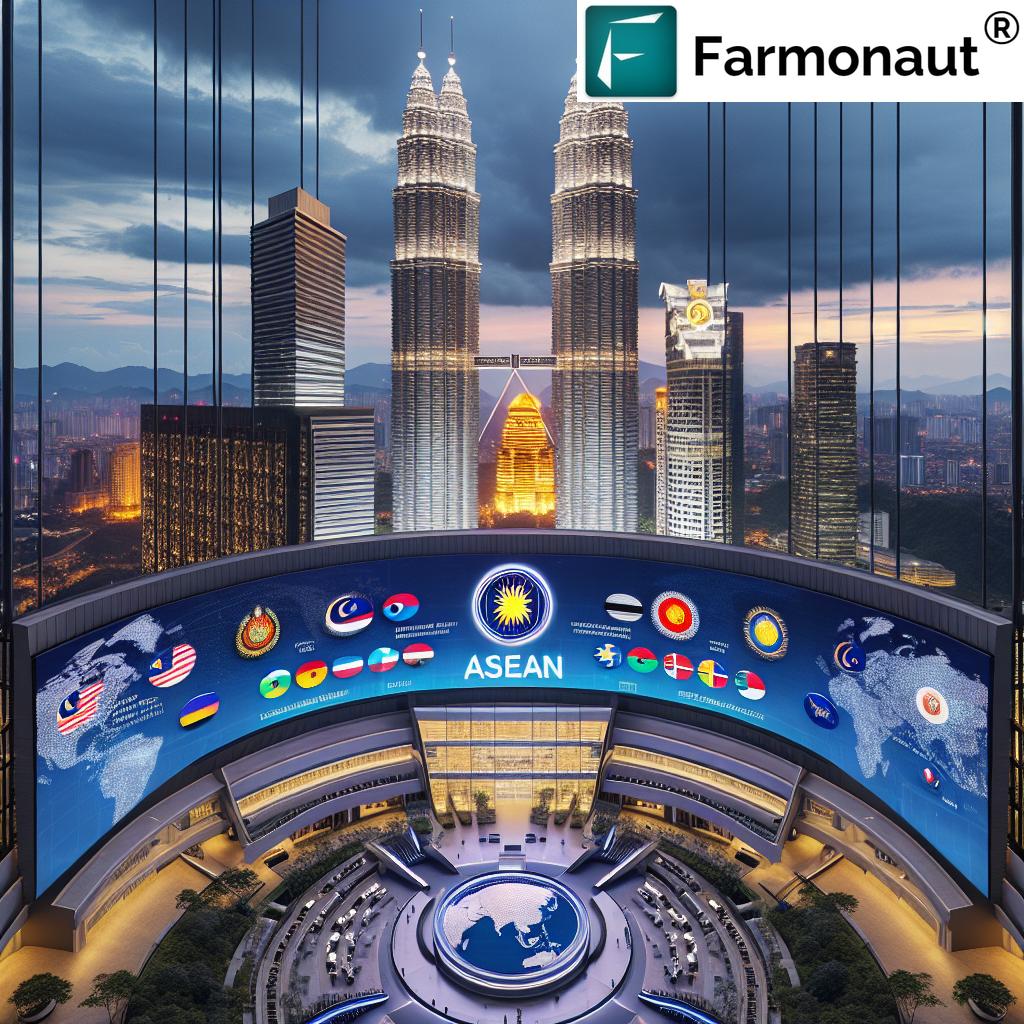Malaysia’s Global Strategy: Navigating ASEAN Cooperation and Regional Security in an Uncertain Era

“Malaysia aims to revitalize key forums like the East Asia Summit during its ASEAN chairmanship in 2025.”
In an era marked by global uncertainty and rapid geopolitical shifts, Malaysia stands at the forefront of Southeast Asian diplomacy, poised to shape the future of regional cooperation and security. As we delve into the intricacies of Malaysia’s global strategy, we uncover a nuanced approach that balances national interests with the collective aspirations of ASEAN member states. This blog post explores the multifaceted dimensions of Malaysia’s strategic vision, its implications for ASEAN cooperation, and the broader impact on regional security in East Asia.
Malaysia’s ASEAN Chairmanship 2025: A Catalyst for Change
As Malaysia prepares to assume the ASEAN chairmanship in 2025, the nation is set to play a pivotal role in rejuvenating key regional mechanisms. The East Asia Summit (EAS) and ASEAN Plus Three stand out as forums with untapped potential for fostering dialogue and cooperation among Southeast Asian nations. Malaysia’s commitment to revitalizing these platforms underscores its dedication to enhancing regional stability and prosperity.
- Strengthening the East Asia Summit as a strategic dialogue platform
- Reinvigorating ASEAN Plus Three for enhanced economic cooperation
- Promoting inclusive governance within ASEAN structures
The emphasis on these forums reflects Malaysia’s understanding of the importance of multilateral engagement in addressing complex regional challenges. By focusing on the EAS, Malaysia aims to create a more robust platform for discussing strategic and security issues among regional leaders, fostering a sense of shared responsibility and collective action.
Navigating Great Power Dynamics
In the complex landscape of international relations, Malaysia adopts a pragmatic approach to its relationships with global powers, particularly the United States and China. This balanced strategy is crucial for safeguarding Malaysia’s national interests while contributing to regional stability.
- Maintaining strong economic ties with both the US and China
- Leveraging US investments in the technology sector
- Capitalizing on China’s role as Malaysia’s largest trading partner since 2009
Malaysia’s ability to navigate these relationships demonstrates its diplomatic acumen and strategic foresight. By fostering balanced partnerships, Malaysia not only diversifies its economic foundation but also enhances its competitive stance as an open and resilient economy in the global arena.
Economic Development and Sustainable Growth
At the heart of Malaysia’s global strategy lies a commitment to sustainable economic development. The nation recognizes that long-term prosperity hinges on inclusive growth models that address socioeconomic disparities while promoting environmental sustainability.
- Promoting sustainable investment opportunities
- Addressing poverty and wealth inequality
- Integrating sustainable development goals into national policies
Malaysia’s approach to economic development aligns with global trends towards sustainability and inclusive growth. By positioning itself as a champion of these principles, Malaysia not only enhances its own economic prospects but also sets a precedent for responsible development in the region.
Explore how Farmonaut supports sustainable agriculture: 
Regional Security: A Collaborative Approach
Malaysia’s vision for regional security is rooted in collaboration and mutual understanding. The nation advocates for a collective approach to addressing security challenges, emphasizing the importance of dialogue and cooperation over confrontation.
- Enhancing ASEAN’s role in regional security architecture
- Promoting peaceful resolution of territorial disputes
- Strengthening maritime security cooperation
By championing these initiatives, Malaysia aims to create a more stable and secure environment in Southeast Asia. This approach not only serves Malaysia’s national interests but also contributes to the overall peace and prosperity of the region.
Fostering Innovation and Technological Advancement
In an era dominated by rapid technological change, Malaysia recognizes the importance of innovation in driving economic growth and enhancing national competitiveness. The country’s strategy includes a strong focus on developing its tech sector and embracing digital transformation across industries.
- Attracting foreign investment in high-tech industries
- Supporting local tech startups and innovation ecosystems
- Promoting digital literacy and skills development
Malaysia’s commitment to technological advancement is evident in its efforts to create a conducive environment for tech companies and startups. By leveraging partnerships with global tech leaders and fostering local talent, Malaysia aims to position itself as a hub for innovation in Southeast Asia.
Discover Farmonaut’s innovative agricultural solutions: 

Strengthening ASEAN Economic Integration
Malaysia’s global strategy places significant emphasis on deepening economic integration within ASEAN. This focus is crucial for enhancing the region’s collective economic strength and resilience in the face of global uncertainties.
- Promoting intra-ASEAN trade and investment
- Advocating for the reduction of non-tariff barriers
- Supporting the development of regional value chains
By championing these initiatives, Malaysia aims to create a more integrated and competitive ASEAN economic community. This approach not only benefits Malaysia but also contributes to the overall economic development of Southeast Asia, enhancing the region’s attractiveness as a global investment destination.
“Malaysia’s global strategy balances relationships with major powers while representing the interests of 10 ASEAN member states.”
Addressing Climate Change and Environmental Sustainability
As a nation vulnerable to the impacts of climate change, Malaysia places significant importance on environmental sustainability in its global strategy. The country’s approach combines domestic initiatives with active participation in international climate efforts.
- Implementing national policies to reduce carbon emissions
- Promoting renewable energy adoption and green technology
- Collaborating with ASEAN partners on transboundary environmental issues
Malaysia’s commitment to environmental sustainability aligns with global efforts to combat climate change. By taking a proactive stance on these issues, Malaysia not only contributes to global environmental goals but also positions itself as a leader in sustainable development within the region.
Learn how Farmonaut supports sustainable farming practices: Explore Farmonaut’s API
Enhancing People-to-People Connectivity
A key aspect of Malaysia’s global strategy is the promotion of people-to-people connectivity within ASEAN and beyond. This focus on cultural exchange and social integration is vital for fostering a sense of shared ASEAN identity and enhancing regional cohesion.
- Supporting educational exchanges and scholarship programs
- Promoting cultural diplomacy and tourism initiatives
- Facilitating labor mobility within ASEAN
By emphasizing people-to-people connections, Malaysia aims to strengthen the social fabric of ASEAN, creating a more integrated and harmonious regional community. This approach not only enhances mutual understanding among ASEAN citizens but also contributes to the region’s soft power on the global stage.
Comparative Analysis of Malaysia’s Strategic Priorities
| Strategic Area | Current Focus | 2025 ASEAN Chairmanship Goals |
|---|---|---|
| Regional Security | Promoting dialogue and peaceful dispute resolution | Strengthening EAS as a platform for strategic discussions |
| Economic Cooperation | Balancing relationships with US and China | Deepening ASEAN economic integration |
| Sustainable Development | Implementing national sustainability policies | Leading ASEAN initiatives on climate change and green technology |
| Global Power Relations | Maintaining strategic neutrality | Enhancing ASEAN’s collective voice in global affairs |
Challenges and Opportunities Ahead
As Malaysia navigates its global strategy and prepares for its ASEAN chairmanship, several challenges and opportunities lie ahead:
- Balancing diverse interests within ASEAN
- Addressing emerging security threats, including cybersecurity
- Navigating the economic impact of global trade tensions
- Capitalizing on opportunities in digital economy and green technology
Malaysia’s ability to address these challenges while leveraging opportunities will be crucial in realizing its vision for regional cooperation and security. The nation’s pragmatic approach and commitment to inclusive growth position it well to lead ASEAN towards a more integrated and resilient future.
Explore Farmonaut’s developer resources: API Developer Docs
The Role of Innovation in Malaysia’s Strategy
Innovation plays a pivotal role in Malaysia’s global strategy, serving as a key driver for economic growth and competitiveness. The country’s focus on fostering a culture of innovation extends across various sectors, including agriculture, where technology is transforming traditional practices.
- Investing in research and development across key industries
- Promoting public-private partnerships in innovation
- Leveraging technology to enhance productivity and sustainability
Malaysia’s commitment to innovation is exemplified by initiatives that support the adoption of cutting-edge technologies in sectors like agriculture. Companies like Farmonaut, which offers advanced satellite-based farm management solutions, represent the kind of innovative approaches that Malaysia seeks to nurture and promote.
Earn With Farmonaut: Join our affiliate program and earn 20% recurring commission by helping farmers save 10%. Onboard 10 Elite farmers monthly to earn a minimum of $148,000 annually—start now and grow your income!
Conclusion: Malaysia’s Path Forward
As we look towards Malaysia’s ASEAN chairmanship in 2025 and beyond, it’s clear that the nation’s global strategy is both ambitious and pragmatic. By focusing on regional cooperation, sustainable development, and innovation, Malaysia is positioning itself as a key player in shaping the future of Southeast Asia.
The success of Malaysia’s approach will depend on its ability to navigate complex geopolitical dynamics, foster inclusive economic growth, and lead by example in addressing shared regional challenges. As Malaysia continues to refine and implement its strategy, it has the potential to not only enhance its own prosperity but also contribute significantly to the stability and development of the entire ASEAN region.
In an era of unprecedented global change, Malaysia’s balanced and forward-looking approach offers a beacon of hope for regional cooperation and sustainable growth. As the nation prepares to take the helm of ASEAN, the world will be watching closely to see how Malaysia’s global strategy unfolds and shapes the future of Southeast Asia.
FAQ Section
Q: What are the key objectives of Malaysia’s global strategy?
A: Malaysia’s global strategy aims to enhance regional cooperation within ASEAN, balance relationships with global powers, promote sustainable economic development, and address regional security challenges.
Q: How does Malaysia plan to revitalize ASEAN forums during its 2025 chairmanship?
A: Malaysia intends to strengthen the East Asia Summit and ASEAN Plus Three by promoting more active engagement, fostering strategic dialogues, and enhancing their effectiveness in addressing regional issues.
Q: What role does innovation play in Malaysia’s strategy?
A: Innovation is central to Malaysia’s strategy, with a focus on fostering technological advancement, supporting startups, and promoting the adoption of cutting-edge technologies across various sectors, including agriculture.
Q: How does Malaysia balance its relationships with the US and China?
A: Malaysia maintains a pragmatic approach, leveraging US investments in technology while benefiting from strong trade relations with China, aiming to diversify its economic partnerships and maintain strategic neutrality.
Q: What are the main challenges Malaysia faces in implementing its global strategy?
A: Key challenges include balancing diverse interests within ASEAN, addressing emerging security threats, navigating global trade tensions, and promoting sustainable development amidst climate change concerns.



